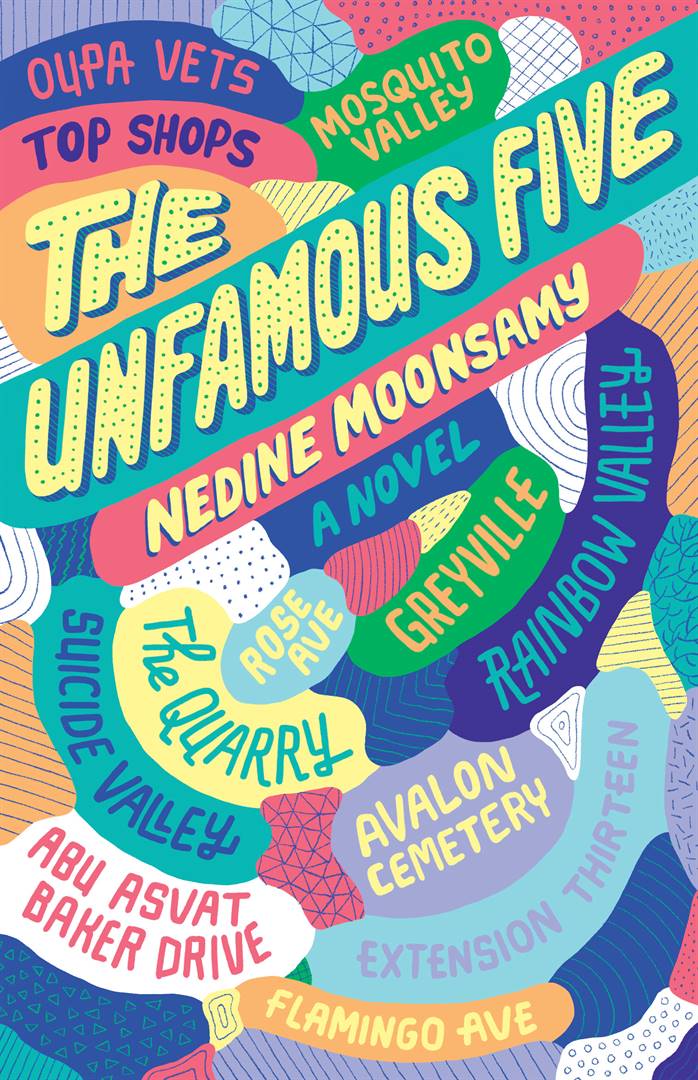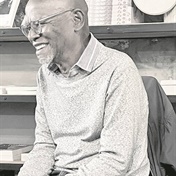
In this extract from Nedine Moonsamy’s debut novel, five teenagers from the Indian suburb of Lenasia are on holiday when they decide to break the rules and take a walk to Suicide Valley.
The Unfamous Five
By Nedine Moonsamy
Published by Modjadji Books
R280
Janine scoffs. Even though Neha has explained the story many times, she is still clueless as to what those five simple characters – no doubt she is the dog – that Enid Blyton wrote about have to do with their lives.
This is the problem with books, she thinks. Reality suffers under the gaze of people who read too much and then read too much into life.
There is no book that will make her life better, no book that will change her father, her mother, the way her food tastes and the manner in which a dog barks.
She pities Neha, whose literary capacities are overdeveloped to the point of delusion.
For the rest of them Romeo and Juliet is merely a school setwork to endure, but for Neha it has come to reflect the inner workings of her latest crush.
She has walked them through it point by point: yes, they can all see the feuding families, the Hindu girl and her Muslim love interest.
But if these star-crossed lovers were ever found dead, they imagine that there would only be gossip about drugs or brainwashing.
Unlike Neha, they remain doubtful about whether a love of this kind can heal the unspoken animosities or the polite non-mixing of these very different religions.
When they set out from the house, they walk all along Rose Avenue, a peculiar rose with its long and straight arrangement of petals.
Shejal clutches Kumari’s wicker picnic basket awkwardly as they move quickly on this street; a main vein that connects the residential areas to Top Shops, mothers to groceries, young people to fast food and domestic workers to taxis.
A relative, a family friend, might see them and pull them back into captivity.
Janine feels the most vulnerable in her uniform; a readymade invitation for a bored patrolling policeman.
Who would believe her innocence? Who would believe that she has very little that resembles a casual wardrobe, that her parents don’t even know when her school holidays are and that they have never asked?
A dishevelled man walks in dizzy loops. He crosses their path and the sour stench of stale beer lingers in the air in front of them.
“Ah, hallo, Jocelene. Jocelene, hallo,” he slurs.
“Uh, hello, Uncle,” says Janine, mortified as her friends’ surprise settles on her.
“Joh, who the fuck was that?” says Shejal when the man staggers away. “Eish, you know some hardcore characters, Janine.”
“Jocelene,” laughs Neha.
“No seriously, who was that?” asks Shejal. He has never come that close to a homeless person before.
She looks up at each of them, their polite faces turned away. She knows they are all equally hungry for a dirty tale; a glimpse at a world that their parents have probably warned them about.
“He’s Alkee Uncle. He stays in the same road as me, or used to stay in the same road. But then his wife threw him out and now he has taken a vow to drink himself to death until she takes him back. He doesn’t eat, just drinks, for breakfast, lunch and supper.”
“Why did she throw him out?” asks Neha.
“Cos he was drinking,” says Janine, “but maybe it’s cos she wanted to be with that coloured man who now stays there with her. Who knows.”
The Five finally reach the very end of Rose Avenue and pass through the station market of vendors, taxi drivers and travellers.
They weave through the street-side fruit and vegetables; the bananas, oranges, tomatoes, cabbages, smelling both rancid and ripe.
They are laid out on colourful plastic plates, measured into fixed prices of five rands.
There are chicken feet and mielies roasting on fires made inside old oil drums.
Large women covered in printed blankets nurse their flames. Ripples of heat float through the air and turn the world into wavy sheets of plastic.
They try hard not to lose each other as their eyes feed on the spectacle of chaos, dirt, life and poverty.
They cruise amongst the stalls; cheap plastic combs, aprons for domestic workers and frilly dresses for little girls in small, medium and large.
They pass a makeshift tent with a hairdresser inside. The buzz of the electric razor never pauses.
A board full of painted illustrations of the kind of haircuts one can receive inside stands at the front. The Five stop to look at the beheaded portraits of black men with their neat, cropped sponge-tops.
“All of those haircuts look the same,” Shejal laughs.
“Well, there isn’t much they can do with their kind of hair,” says Kumari, who secretly sympathises with the stubborn curl that sprouts on African heads.
Her curly, dry bush of hair is nothing like the graceful, whip-in-the-wind manes of Janine and Neha.
She is the unfortunate kroeshaar of the family, as her grandmother is so fond of pointing out.
Kumari constantly wears her hair in a tight bun of necessity and shame.
It is to train her hair into new thinking and to hide its wicked rebelliousness, just like those men who shear their hair into nullities, never letting the sponge spew out into fully-fledged Afros.
They continue walking until they reach “the toppest of Top Shops!” Neha announces it theatrically, in contrast to the lacklustre scene.
A mangy dog pees on a single, drying rose bush in front of the local post office whose red and blue façade is as cracked and faded as the face of a cheap clown.
“Joh, this is so swak,” Kumari pouts.
“Argh, never mind … there’s still Suicide Valley to see,” says Devon.
“Ja, come,” barks Shejal as he starts marching ahead down Lenasia Drive. “Let’s go gang! Let’s go.” He claps his hands to get them to pick up the pace.
Once the houses have all but disappeared from view, the stretch of dry veld opens up in front of them. Kumari begins to shiver as the winds lick the fresh sweat from the back of her neck.
“Shej, didn’t your mother warn about Suicide Valley?” she asks him in a whisper directed straight into his ear.
“Of course she did, but you should know better than to heed my mother’s warnings by now,” he says as he drags her by the arm.
“You’ll never go anywhere.”
“Who died here anyways? Did anyone really kill themselves here?” asks Neha. “It’s probably all bull.”
“Are you kidding me?” says Janine. “Come, I’ll show you where it was done.”
She trots ahead of the group as if smelling a trail. She brings them all to a high chain-link fence that circles the quarry.
Their fingers spill through the holes as they fasten themselves to it, staring down into the muddy water.
The fence creaks and bends under their weight; they sway along the border of life and death.
“But what could possibly make you drown yourself?” asks Kumari.
“Ja, well, people were poor in those days,” says Neha. “I mean, if you poor, how else would you commit suicide? No pills, no gun, just good old-fashioned drowning.”
“Oh ja, and Indian people were dirt poor in those days, neh?” says Kumari, the history of a struggle just dawning on her.
“Ja, so poor and they would still have twenty thousand children,” says Devon with a laugh.
“Oh God, you should hear my father’s stories about how he had to walk two kilometres with no shoes just to get to school because they were so poor and he had so many brothers and blah, blah, blah…” says Neha.
“Eish you should hear my granny’s stories! She’s even worse. She’s got some about how she had to collect cow dung just so that they could use it to cook,” laughs Shejal.
Janine watches the rest of them giggle at these anecdotes, but like Neha’s father, like Shejal’s grandmother, she knows there is nothing funny about being poor.
“I wonder how many people died in here,” she says, still stuck to the fence like a fly in a web. “And why.”
A wretched wind begins to blow. In the open field they are left exposed to the blasts that howl around them.
The reeds in the swamp begin to whip wildly against each other. The birds scatter in disarray and dart above the Five in a panic of having been evacuated without notice.




 Publications
Publications
 Partners
Partners








